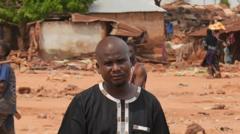As Nigeria grapples with high fertility rates and an expanding youth population, the popular comedy series "Gidan Badamasi" has become a catalyst for conversations around the consequences of having large families, reflecting the challenges and opportunities of the continent's demographic boom.
Nigeria's Baby Boom: A Comedy Series Ignites Fertility Debate

Nigeria's Baby Boom: A Comedy Series Ignites Fertility Debate
The hit Nigerian TV show "Gidan Badamasi" prompts critical discussions on family size and its implications amidst the country's rapid population growth.
The lively atmosphere at the Sani family's modest home in Kano, Nigeria, is filled with the chatter of children eagerly anticipating their weekly dose of laughter from the comedy drama "Gidan Badamasi." On Thursday nights, families across the region unite in their living rooms, mirroring the daily realities entwined with the show's narrative. The central theme touches on a strikingly relevant issue: the impact of having numerous children, which resonates deeply during Nigeria's ongoing population boom.
As one of the youngest nations on the planet, Nigeria, like many other parts of Africa, faces unique demographic challenges and advantages. The popularization of "Gidan Badamasi" has not only entertained but has also sparked crucial discussions regarding familial responsibilities and societal expectations, especially in a country where women average over five children each.
The show features a wealthy protagonist whose extravagant lifestyle is undermined by his excessive number of wives and children, a portrayal that resonates with many viewers aware of similar dynamics in their own communities. This portrayal serves as a mirror reflecting the socio-economic hurdles tied to high birth rates in the region.
As Africa's youth population soars, the continent must navigate the complexities of education, employment, and resource allocation to harness the potential of its burgeoning demographic. While there are significant opportunities for growth, there are equally formidable challenges, making discussions around family size increasingly vital.
The dialogue inspired by "Gidan Badamasi" points to a wider shift within Nigerian society—evolving attitudes towards family planning, economic stability, and traumas of overpopulating—a conversation that cannot be ignored as the continent's youth bulge continues to expand and reshape regional dynamics.



















